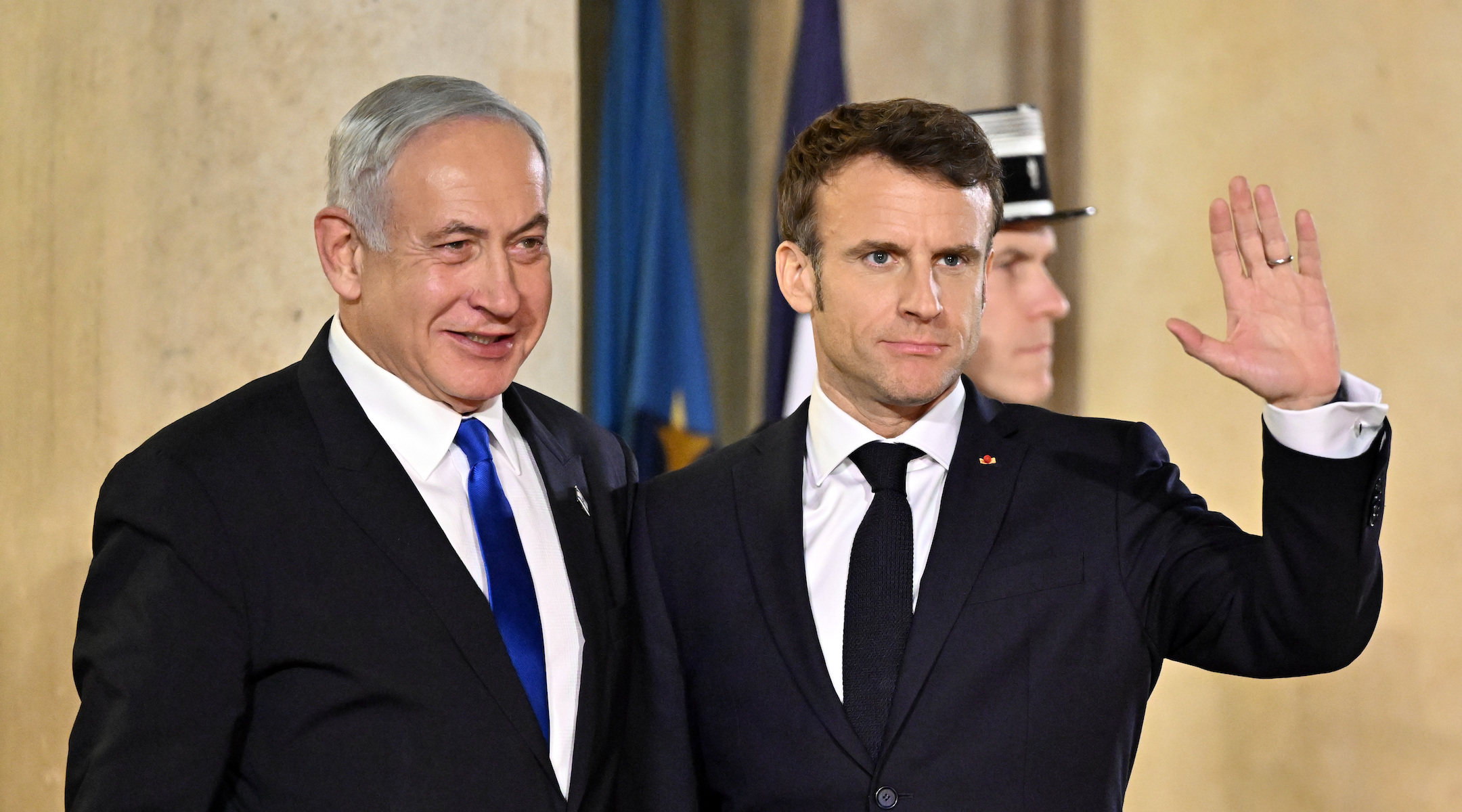France says it won’t arrest Netanyahu, despite ICC warrant against him
France joins Argentina and Hungary in saying they won’t execute the International Criminal Court’s warrants

Israeli Prime Minister Benjamin Netanyahu and French President Emmanuel Macron pose prior to a working dinner at the Elysee Palace in Paris, Feb. 2, 2023. (Mustafa Yalcin/Anadolu Agency via Getty Images)
(JTA) — France has joined the nations who are signatories to the agreement that established the International Criminal Court pledging not to honor its warrants to arrest Israeli Prime Minister Benjamin Netanyahu or his former defense minister, Yoav Gallant.
The statement Wednesday by the French foreign ministry adds France to Argentina and Hungary as parties to the 1998 Rome Statute whose leaders have said they will not abide by the warrants. The warrants, issued earlier this month, allege that Netanyahu and Gallant committed war crimes and crimes against humanity during Israel’s current war against Hamas in Gaza.
The French foreign ministry statement said the warrants were flawed because Israel was not a party to the agreement establishing the court.
The Rome Statute “stipulates that a State cannot be required to act inconsistently with its obligations under international law with respect to the immunities of States not party to the ICC,” the statement said. “Such immunities apply to Prime Minister Netanyahu and the other ministers concerned and will have to be taken into account should the ICC request of us their arrest and surrender.”
The declaration came a day after Netanyahu entered a ceasefire with Hezbollah in Lebanon jointly brokered by France and the United States, suggesting to some that France’s position on the ICC warrants might have been negotiated as part of the deal.
“In accordance with the long-standing friendship between France and Israel, two democracies committed to the rule of law and to respect for a professional and independent justice system, France intends to continue working in close cooperation with Prime Minister Netanyahu and the other Israeli authorities to achieve peace and security for all in the Middle East,” it said.
The tone was markedly different from last month, when French President Emmanuel Macron and Netanyahu openly bickered over Macron’s threat to suspend arms sales to Israel over its conduct of the war in Gaza.
The other two Rome Statute signatories that have vowed not to enforce the warrants both have right-wing governments that have fully supported Israel in its multi-front war.
Of the 124 Rome Statute signatories, a number of countries, including countries where Israeli officials travel frequently, have said they would honor the warrants, including Canada, the Netherlands and Switzerland. Others have not yet declared one way or the other, among them Britain and Germany.
The United States is not a signatory and President Joe Biden has called the warrants “outrageous.” Republicans have predicted that President-elect Donald Trump may reinstate sanctions against the court’s staff.
In a statement on Wednesday, Netanyahu’s office said Israel would appeal the warrants and ask for a stay on their implementation.
“Israel submitted an announcement to the ICC today regarding its intention to appeal to the court along with a demand to delay implementation of the arrest warrants,” his office said. “Israel’s notice of appeal shows in detail to what degree the decision to issue the arrest warrants was baseless and without any factual or legal foundation whatsoever.”
The ICC says it may act against non-parties to the agreement if a party — in this case Palestine — has been affected by the alleged crimes. It used similar logic last year in issuing a warrant for the arrest of Russian President Vladimir Putin, whose country is also not a Rome Statute signatory. In that case, the ICC cited international law against the unlawful transport of children as superseding whether the targeted national’s homeland is a signatory.
A message from our Publisher & CEO Rachel Fishman Feddersen

I hope you appreciated this article. Before you go, I’d like to ask you to please support the Forward’s award-winning, nonprofit journalism so that we can be prepared for whatever news 2025 brings.
At a time when other newsrooms are closing or cutting back, the Forward has removed its paywall and invested additional resources to report on the ground from Israel and around the U.S. on the impact of the war, rising antisemitism and polarized discourse.
Readers like you make it all possible. Support our work by becoming a Forward Member and connect with our journalism and your community.
— Rachel Fishman Feddersen, Publisher and CEO


























